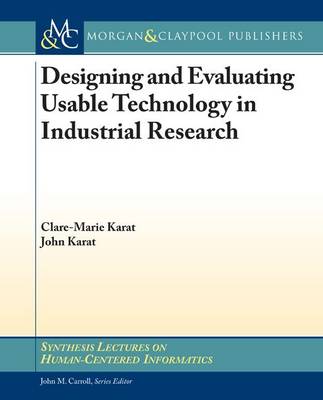Synthesis Lectures on Human-Centered Informatics
1 total work
Designing and Evaluating Usable Technology in Industrial Research
by Clare-Marie Karat and John Karat
Published 12 February 2010
This book is about HCI research in an industrial research setting. It is based on the experiences of two researchers at the IBM T. J. Watson Research Center. Over the last two decades, Drs. John and Clare-Marie Karat have conducted HCI research to create innovative usable technology for users across a variety of domains. We begin the book by introducing the reader to the context of industrial research as well as a set of common themes or guidelines to consider in conducting HCI research in practice. Then case study examples of HCI approaches to the design and evaluation of usable solutions for people are presented and discussed in three domain areas:item Conversational speech technologies,item Personalization in eCommerce, anditem Security and privacy policy management technologies
In each of the case studies, the authors illustrate and discuss examples of HCI approaches to design and evaluation that worked well and those that did not. They discuss what was learned over time about different HCI methods in practice, and changes that were made to the HCI tools used over time. The Karats discuss trade-offs and issues related to time, resources, and money and the value derived from different HCI methods in practice. These decisions are ones that need to be made regularly in the industrial sector. Similarities and differences with the types of decisions made in this regard in academia will be discussed.
The authors then use the context of the three case studies in the three research domains to draw insights and conclusions about the themes that were introduced in the beginning of the book. The Karats conclude with their perspective about the future of HCI industrial research.
In each of the case studies, the authors illustrate and discuss examples of HCI approaches to design and evaluation that worked well and those that did not. They discuss what was learned over time about different HCI methods in practice, and changes that were made to the HCI tools used over time. The Karats discuss trade-offs and issues related to time, resources, and money and the value derived from different HCI methods in practice. These decisions are ones that need to be made regularly in the industrial sector. Similarities and differences with the types of decisions made in this regard in academia will be discussed.
The authors then use the context of the three case studies in the three research domains to draw insights and conclusions about the themes that were introduced in the beginning of the book. The Karats conclude with their perspective about the future of HCI industrial research.
